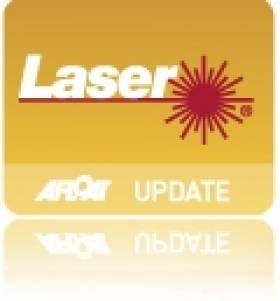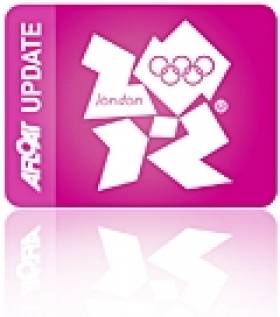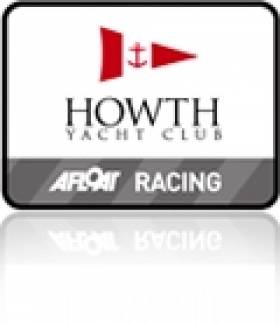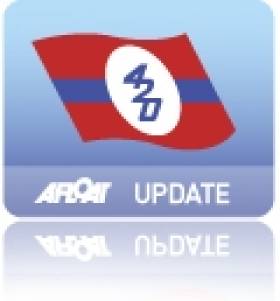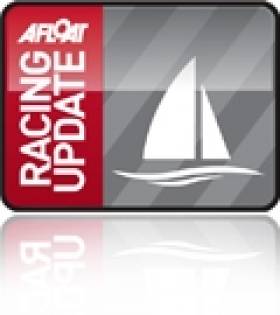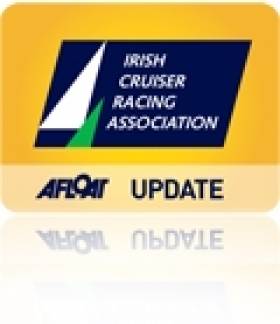Displaying items by tag: royal st.george yc
Irish Junior Success at UK Laser Championships
Dun Laoghaire's Conor O'Beirne of the Royal St George YC won the Laser 4.7 UK Championships in Abersoch at this week-long regatta. Sailed in a variety of conditions from heavy to medium shifty conditions with a few light races thrown in for good measure O'Beirne finished with a 10-point margin and a race to spare. The event included an Irish representation of eight sailors, all of whom were competive in the fleet. Aisling Keller of LDYC challenged for the lead up to the final day, finishing a close third overall. At the mid-point, Irish sailors occupied five of the top ten places. Sorcha Ni Shuilleabhain of KYC finished in the top ten with Eric Ruigrok RSC placing 15th. Overall the Irish sailors finished strongly with most well inside the top half which bodes well for Irish Laser sailing into the future.
In the Laser Radial fleet, Daragh O'Sullivan of KYC put together a very strong series, including three bullets, to finish fifth overall. Dan O'Beirne from RStGYC also sailed a consistent series with string of top ten finishes to place 9th overall.
The event also featured top twenty placings for Cian Cahill, RStGYC and Ryan Glynn, BYC with the majority of the rest of the Irish sailors showing well in the Gold Fleet. Considering the Radial class included two GBR Olympic campaigners in the fleet of almost 100 along with the RYA-funded GBR Radial squad of 14 sailors, Irish Radial sailors have a lot to be happy about.
The championships consisted of a 12 race series with the best 10 races to count over six days competition.
Laser 4.7 UK Champs Overall
| Series Place | Sail No | Helm | M/F | Crew | Category | Tally | UK Nats |
|---|---|---|---|---|---|---|---|
| 1 | 183231 | Conor O'BEIRNE | G | J | 4.7-042 | I | |
| 2 | 174568 | Will CREAVEN | G | Y | 4.7-010 | W | |
| 3 | 193620 | Aisling KELLER | L | G | J | 4.7-046 | I |
| 4 | 202458 | Hamish ECKSTEIN | G | J | 4.7-023 | ||
| 5 | 179795 | Sam MCKAY | G | Y | 4.7-014 | ||
| 6 | 191850 | Georgia BOOTH | L | G | J | 4.7-027 | |
| 7 | 195118 | Tom JOESBURY | G | J | 4.7-030 | W | |
| 8 | 201701 | Sophie HERITAGE | L | G | J | 4.7-039 | |
| 9 | 165292 | Joe WOODLEY | G | J | 4.7-008 | ||
| 10 | 198435 | Sorcha NI SHUILLEABHAIN | L | G | Y | 4.7-049 | I |
| 11 | 193494 | Jack ROCKETT | G | J | 4.7-029 | ||
| 12 | 151286 | Simon WEATHERSPOON | G | J | 4.7-005 | ||
| 13 | 161777 | Caitlin TWEEDLE | L | G | Y | 4.7-007 | |
| 14 | 186262 | Josh ATHERTON | G | J | 4.7-020 | ||
| 15 | 197362 | Erica RUIGROK | L | G | J | 4.7-048 | I |
| 16 | 196999 | David HAW | G | J | 4.7-032 | ||
| 17 | 197899 | Karyna MANUEL | L | G | J | 4.7-034 | |
| 18 | 180292 | Emily GENT | L | G | J | 4.7-015 | |
| 19 | 185978 | Rupert DANIELS | G | Y | 4.7-019 | ||
| 20 | 193576 | Craig CAMPBELL | G | Y | 4.7-045 | ||
| 21 | 198827 | Jacob FARREN-PRICE | G | J | 4.7-036 | ||
| 22 | 186695 | Sophie TAYLOR | L | G | Y | 4.7-021 | S |
| 23 | 19617 | Hanna BRANT | L | S | J | 4.7-017 | |
| 24 | 192861 | Andrew LEVIE | G | Y | 4.7-044 | I | |
| 25 | 130583 | Verity HOPKINS | L | S | Y | 4.7-003 | |
| 26 | 189216 | Scott O'SULLIVAN | G | J | 4.7-043 | I | |
| 27 | 178210 | Sam TWEEDLE | S | J | 4.7-013 | ||
| 28 | 149321 | Harry COBBY | S | Y | 4.7-009 | ||
| 29 | 196243 | Lucy BURROWS | L | G | Y | 4.7-047 | I |
| 30 | 119333 | Fred WARREN-SMITH | S | Y | 4.7-002 | ||
| 31 | 185655 | Sam CHILTON | S | J | 4.7-018 | ||
| 32 | 153740 | Chelsea JACKSON | L | S | Y | 4.7-006 | W |
| 33 | 191038 | Sam THOMAS | S | J | 4.7-025 | W | |
| 34 | 189370 | Edward DOWNES | S | Y | 4.7-024 | W | |
| 35 | 197705 | Aimee O'BRIEN | L | S | J | 4.7-033 | |
| 36 | 187491 | Ollie TAIT | S | J | 4.7-022 | ||
| 37 | 191693 | James EADY | S | J | 4.7-026 | ||
| 38 | 180777 | Harriet PHILO POWELL | L | S | J | 4.7-016 | |
| 39 | 201836 | Tom FENEMORE | S | J | 4.7-040 | ||
| 40 | 199271 | Fiona HARRINGTON | L | S | Y | 4.7-037 | |
| 41 | 191794 | James WILLIAMS | S | Y | 4.7-035 | W | |
| 42 | 200748 | Tai THOMAS-DAY | S | J | 4.7-038 | ||
| 43 | 192517 | Rosie POVALL | L | S | Y | 4.7-028 | |
| 44 | 136198 | Steph HARDING | L | S | Y | 4.7-050 | |
| 45 | 186068 | Poppy DANIEL | L | S | J | 4.7-041 | |
| 46 | 196381 | Melissa BRADY | L | S | J | 4.7-031 | S |
| 47 | 176716 | Tadhg O'FARRELL | S | J | 4.7-011 | ||
| 48 | 133335 | Millie HOPKINS | L | S | J | 4.7-004 | |
| 49 | 118465 | Melissa COULTON-MCCULLOUGH | L | S | J | 4.7-001 |
40 Knot Winds Cancel Star Racing in Dun Laoghaire
Tight at top of Squib Nationals after first day
It’s tight at the top of the leaderboard after the first three races of the SIAC Construction Squib National Championships at Howth Yacht Club today (Sat.30th), which saw three different race winners, each representing the three main Squib fleets. PHOTOS HERE.
Sailing in moderate south-easterlies that increased in strength as the day went on, the 37-boat fleet was led home in the first race by Howth’s ‘Kerfuffle’ (Jonathan Craig/Hazel Ruane) followed by ‘Ruby Blue’ (Aidan O’Connell/Sian McCleave) of the Royal St.George YC and then ‘Inshallah’ (David Eccles/Philip Hutchinson) of the Royal North of Ireland YC.
Defending champions Peter Wallace and Kerry Boomer of RNIYC in ‘Toy for the Boy’ showed the way in race 2, followed by ‘Inshallah’ and ‘Quickstep III’ (Gordon Patterson/Ross Nolan) to make it a Cultra 1-2-3.
The third race was won by ‘Ruby Blue’, with ‘Quickstep III’ in second ahead of ‘Fagin’ (Michael & David Hill, RNIYC) in third. Subject to protest, Aidan O’Connell has a one point advantage over Peter Wallace with Craig and Eccles joint third on 12 points.
Cork Girls take 420 Dinghy Leinster Title
The National Yacht Club hosted the 420 dinghy Leinster Sailing Championships over the Easter Weekend, attracting twelve boats and visiting crews travelling from Crosshaven, Kinsale, Malahide, Spiddal, Tralee and Wexford.
Emma Geary and Niamh Connolly from Royal Cork YC counted four wins and a second place in the six-race series to win the event convincingly. The girls will be aiming to repeat their success next weekend at the ISA Mitsubishi Youth Nationals in Dun Laoghaire in order to secure a nomination to the 2011 ISAF Youth Worlds, which will be held in Croatia.
Fiona and Patrick Daly of Tralee Bay SC finished second overall with a very consistent four 2nds and two 3rds Aodh Kennedy/Daniel Browne (Kinsale YC) who were third overall and Richard D’Esterre/Peter Stokes (CYS/Royal Munster) also recorded race wins.
Alanna Lyttle and Cian Guifoyle (Royal St.George YC) narrowly defeated fellow newcomers Emily Jones and Liadh Conway (Wexford Harbour BC) for the Silver Fleet Trophy.
PRO Larry Power and his mark laying teams provided excellent racing in sometimes challenging wind conditions while Sandra Moore ran the race office throughout the weekend.
Full results available here.
O'Neill Makes Clean Sweep of Bay SB3 Prizes
Barry O'Neill made a clean sweep of the prizes for the third year running in the SB3 class on Dublin Bay. James Gorman showed form to win series 3.YC. The class announced its annual Dublin Bay Sailing Club prizewinners ahead of the prize giving ceremony, on of the biggest nights of the sailing year in Dun Laoghaire, on Friday 12th November at the Royal St.George YC. The winners are:
SB3 DBSC Prize Winners 2010
Sunday Overall
1st. Sin Bin Barry O'Neill 1st. Silver Fleet Bob Hobby
2nd. Alert Packaging Justin Burke
3rd. Seriously Bonkers Martin Cuppage
Sunday Series 1
1st. Mephisto Stephanie and Tim Bourke
2nd. Seriously Bonkers Martin Cuppage
3rd.Alert Packaging Justin Burke
Sunday Series 2
1st. Alert Packaging Justin Burke
2nd.Sin Bin Barry O'Neill
3rd. Design Security Colin Galavan
Sunday Series 3
1st. Odin James Gorman
2nd. Sin Bin Barry O'Neill
3rd. Seriously Bonkers Martin Cuppage
Thursday Overall
1st. Sin Bin Barry O'Neill
2nd. Design Security Colin Galavan
3rd. Alert Packaging Justin Burke
Thursday Series 1
1st. Sin Bin Barry O'Neill
2nd. Design Security Colin Galavan
3rd. Bom Chickawahwah John O'Driscoll
Thursday Series 2
1st. Sin Bin Barry O'Neill
2nd. Design Security Colin Galavan
3rd. Alert Packaging Justin Burke
Irish team take Cumberand Cup
A Royal St George YC team have taken the prestigious Cumberland Cup over the weekend after a near-flawless series of racing. The team went into the final stages without dropping a single race, and claimed what's thought to be the oldest trophy in sailing for Ireland. The event was sailed in J80s on Queen Mary SC's reservoir, starting on Friday after a royal reception in St James' Palace on Thursday night.
Royal Thames YC has yet to provide any details on the week's racing but we'll have more from the team later in the day. More here now.
Commodore's Cup Team Join ICRA Feeder
The waiting is over for ICRA members writes Claire Bateman and this is the last sailing reminder for anyone still wishing to take part in the feeder race from Cork to Dun Laoghaire on Friday next. This promises to be a challenging and exciting race and will feature three Irish Commodores’ Cup yachts from the Royal Cork Yacht Club, Anthony O'Leary in his Ker 39 Antix, Dave Dwyer in his Mills 39 Marinerscove.ie and Andrew Creighton in Roxy 6, the new Corby 36. This will be Roxy's first competitive outing and there will be much interest in this latest addition to the fleet. Entry for this race is mandatory for any boat wishing to compete in the Commodores' Cup.
As entry for the feeder race does not close until 18.30hrs. on Friday, 14th May at the Royal Cork Club Race Office, it is not known yet which boats will sail and which will travel by road. What can be confirmed is Donal O'Leary of RCYC will be sailing his well known D-tox and Schull Harbour Commodore, Morgan O'Donovan in Loco will be using the feeder as a qualifier for his entry to the Round Ireland Race in June.
First gun will be at 19.55 hrs at Weavers Point on Friday and the start line will be a laid line between a committee boat (Adrielle) and an adjacent mark in the harbour. The finish line will be between the lighthouses on the East and West Piers at the entrance to Dun Laoghaire Harbour. Yachts will record their own finish times together with the names and approximate times of boats immediately ahead and astern, if possible. Time limit for the race will be 12.00 hrs on Sunday, May 16th.


























